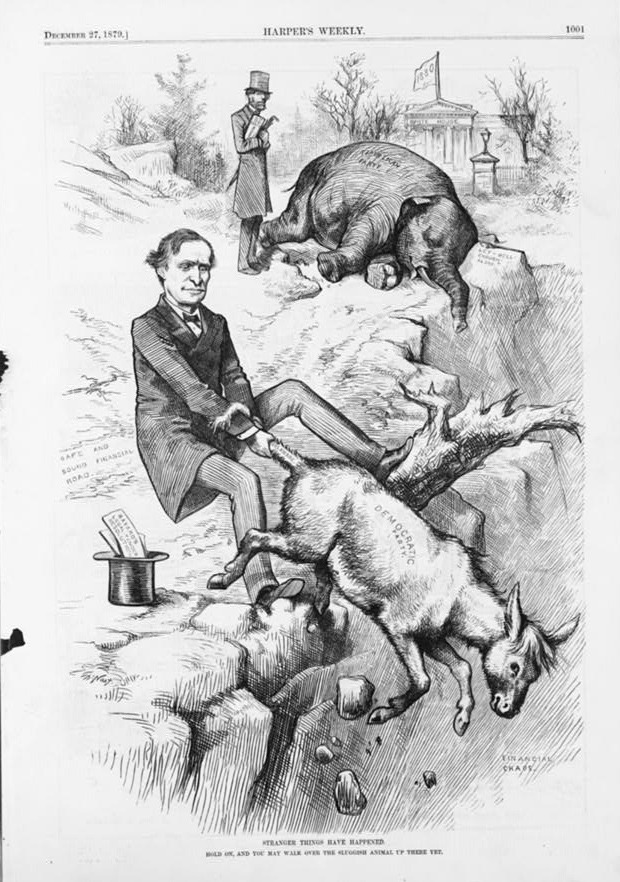In the end, all three parties will moderate their positions because none of the three can go it alone anymore. The more polarizing the proposition, the more likely it is to be discarded. Ideally, the three parties might also come together to pass anti-lobbying and campaign finance reforms.The assumption, however, is that two-party systems are polarizing by definition:
There is no way for one to prevail over the other if they are so similar that it's hard to tell them apart. Each of the two parties has to stake out ground that is sufficiently different from the other that the constituents have a clear choice to make.But such political polarization is not inherent to the duopolist form. It is possible for both political parties to attempt to approximate the perceived positions of the majority of voters, in which case a given voter's preference will likely be determined by other considerations, ex. personality, character, experience, image etc. Polarization is contingent. In 1950, the APSA reported in its influential paper "Toward a More Responsible Two-Party System" that: "Alternatives between the parties are defined so badly that it is often difficult to determine what the election has decided even in broadest terms" (pp. 3-4). This determination remains largely true in many cases today. Despite the appearance of polarization, the difference between the Republican and Democratic Parties is often only rhetorical or stylistic in nature, and even then they mimic one another to relativize competitive advantages. The more similar their positions on such and such a matter, the greater the need to create the appearance of difference.
Socially, culturally and politically, the United States is not bi-polar, it is multi-polar. That this fact is not reflected in our political system is reflective of the impoverishment of that system, 'big tent' circus politics not withstanding. On a whole host of issues, the positions of the US electorate are far more diverse than those of their elected
 representatives, and far more polarized than the duopoly parties even appear to be. One paradoxical result of this ideological formation can be observed in the polarized perception of the duopoly system itself, for instance, when both conservatives and liberals each see their preferred duopoly party as nothing more than a simulation of the other: the RINOS and DINOS and the elephants and asses. Bill Maher clearly expressed a frustration felt by many liberals and progressives when he argued that "We have a center right party, and a crazy party. Democrats have moved to the right, and the right has moved into a mental hospital . . . Democrats are the new Republicans." Conversely, independent conservatives do not see themselves as having left the Republican Party, they see the Republican Party as having left them, as they say, - if not behind then at least in the lurch, one might add. In a piece on his experience at a Tea Party in Texas on Independence Day, Howard Nemerov writes in The Examiner: "We no longer have a two party system: We have the Democrat party, and the Democrat-too party, neither of which adheres to the goals stated on their party websites." Such contradictions mark a limit of duopoly ideology, and at least partially determine our media's myopic focus on irrelevant minutia, the grandstanding of politicians and the speculations of countless "strategists" on all sides of the wretched coin.
representatives, and far more polarized than the duopoly parties even appear to be. One paradoxical result of this ideological formation can be observed in the polarized perception of the duopoly system itself, for instance, when both conservatives and liberals each see their preferred duopoly party as nothing more than a simulation of the other: the RINOS and DINOS and the elephants and asses. Bill Maher clearly expressed a frustration felt by many liberals and progressives when he argued that "We have a center right party, and a crazy party. Democrats have moved to the right, and the right has moved into a mental hospital . . . Democrats are the new Republicans." Conversely, independent conservatives do not see themselves as having left the Republican Party, they see the Republican Party as having left them, as they say, - if not behind then at least in the lurch, one might add. In a piece on his experience at a Tea Party in Texas on Independence Day, Howard Nemerov writes in The Examiner: "We no longer have a two party system: We have the Democrat party, and the Democrat-too party, neither of which adheres to the goals stated on their party websites." Such contradictions mark a limit of duopoly ideology, and at least partially determine our media's myopic focus on irrelevant minutia, the grandstanding of politicians and the speculations of countless "strategists" on all sides of the wretched coin.







2 comments:
Nemerov seems to point to a necessary realization if the Bipolarchy is ever to end. By noting that "neither [party] adheres to the goals stated on their party websites," he hints that the other shoe that must drop after people grow disillusioned with one party is a refusal to demonize the other party. The only way the "lesser of two evils" argument can be refuted decisively is to admit, not that both are evil, but that neither is. Admit that, and the need to vote for the next-strongest party on lesser-evil grounds ought to disappear.
That's a good point, Sam. Interestingly, the quote I posted from the APSA document is from the section on the necessity of the parties' developing clear, reasonable platforms, which they can actually carry out.
Post a Comment